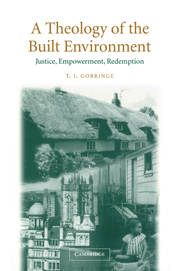Book contents
- Frontmatter
- Contents
- Preface
- 1 The theology of the built environment
- 2 Constructed space and the presence of God
- 3 The land
- 4 The human dwelling
- 5 From Eden to Jerusalem: town and country in the economy of redemption
- 6 The meaning of the city
- 7 Constructing community
- 8 But is it art?
- 9 God, nature and the built environment
- 10 Towards Jerusalem?
- Select bibliography
- Index of names
- Index of subjects
5 - From Eden to Jerusalem: town and country in the economy of redemption
Published online by Cambridge University Press: 22 September 2009
- Frontmatter
- Contents
- Preface
- 1 The theology of the built environment
- 2 Constructed space and the presence of God
- 3 The land
- 4 The human dwelling
- 5 From Eden to Jerusalem: town and country in the economy of redemption
- 6 The meaning of the city
- 7 Constructing community
- 8 But is it art?
- 9 God, nature and the built environment
- 10 Towards Jerusalem?
- Select bibliography
- Index of names
- Index of subjects
Summary
Then Jesus went about all the cities and villages, teaching in their synagogues, and proclaiming the good news of the kingdom …
(Matthew 9.35)‘God became human’, said Luther, ‘that from proud and inhuman gods he might make real human beings.’ Since this refashioning is of flesh and blood the physical environment in which people live, and which also shapes them, is part of the story, part of the economy of redemption. In speaking of the ‘economy of redemption’ I am alluding to the suggestion of Irenaeus of Lyons, in the late second century, that rather than think in a sin–fall–redemption pattern we might rather think of redemption as a process. Human beings were made in God's image, he argued, but had to grow into God's likeness, a process in which they were nurtured by God the Spirit.
Through obedience and discipline and training human beings, who are contingent and created, grow into the image and likeness of the eternal God. This process the Father approves and commands; the Son carries out the Father's plan; the Spirit supports and hastens the process: while humankind gradually advances and mounts towards perfection; that is, they approach the eternal.
Note that Irenaeus' account of redemption is Trinitarian. He describes Christ and the Spirit as the ‘two hands of God’ through whom the process of redemption is effected.
- Type
- Chapter
- Information
- A Theology of the Built EnvironmentJustice, Empowerment, Redemption, pp. 114 - 137Publisher: Cambridge University PressPrint publication year: 2002



